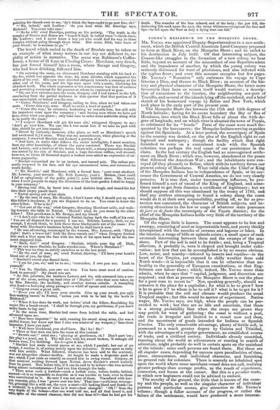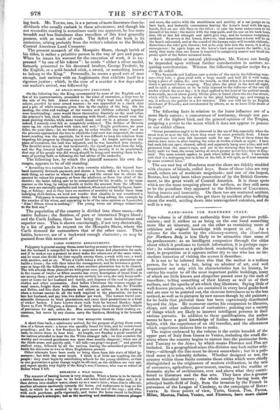YOUNG'S RESIDENCE ON me MOSQUITO SHORE. MR. YOUNG was appointed
Deputy-Superintendent to a new settlement, which the British Central American Land Company proposed to form at Black River, on the Mosquito Shore ; and he sailed to his destination in July 1839. Of that interesting subject, the Crusoe-like struggles in the formation of a new colony we hear little, beyond an account of the misconduct of one Superintendent and the impudence of another, by which the young colony was seriously distressed for want of provisions, and also infected with the typhus fever ; and even this account occupies but few pages. Mr. YOUNG'S "Narrative only embraces his voyage to Cape Gracias a Dios, and thence to Black River ; an account of the history and physical character of the Mosquito Shore, the latter more favourable than facts or reason itself would warrant ; a description of excursions to the interior, the neighbouring sea-port of Truxillo, and several of the islands lying off the mainland, and a brief sketch of his homeward voyage by Belize and New York, which took place in the early part of the present year.
The Mosquito Shore lies between the 11th and 15th degrees of North latitude ; having for its ocean boundary the Bay or Sea of Honduras, into which the Black River falls at about the 84th degree of longitude, and on which river is situated the town of Poyais, so celebrated for its "bonds." Parts of the coast were much frequented by the buccaneers ; the Mosquito Indians serving as guides against the Spaniards. At a later period, the sovereignty of Spain to the country was denied, on the plea of the English right to cut logwood and mahogany ; though the facility which that riiiht furnished to carry on a contraband trade with the Spanish colonists was perhaps the real cause of our persistence in the claim. In the last century the English had an unrecognized settlement on Black River ; which was, however, abandoned at the peace that followed the American War ; and the inhabitants were conveyed (if they pleased) to Belize, which with its territory forms our present colony of Honduras. What valid claim the Chief or King of the Mosquito Indians has to independence of Spain, or its successor the Government of Central America, we do not very clearly perceive. It is true that, under buccaneering influence, be professed himself a sort of vassal of the King of England, and sometimes used to get from Jamaica a certificate of legitimacy ; but we should suppose all this was abandoned by the treaty of 1783, and that: any settlers attempting to found a colony along the coast would do it at their own responsibility, putting off; so far as protection was concerned, the character of British subjects, and becoming obnoxious to the law or usage of whatever state possesses de jure or de facto the sovereignty of the Poyais district ; for the chief of the Mosquito Indians holds very little of the territory of the Mosquito Shore. Of the region little is known. The coast appears to be low and. swampy, consisting of sand or impenetrable bush, and pretty thickly interspersed with the mouths of streams and lagoons or lakes. In the interior, a range of hills or uplands exists ; a small space of rank savannah intervening between them and the swamps of the seashore. Part of the soil is said to be fertile ; and, being a Tropical alluvium, it probably is, were it deyed and brought under cultivation: but how that can be accomplished is by no means obvious. Low, moist, and marshy—infested by insects and reptiles—in the heart of the Tropics, yet exposed to chilly weather from cold North winds—it is impossible that it can be otherwise than unhealthy to the generality of European constitutions, or that Englishmen can labour there ; which, indeed, Mr. YOUNG more than admits, when he says that "capital, judgment, and discretion are required ; and that at present the Mosquito Shore is not the place for a poor man to resort to." Nor, speaking generally, should we conceive it the place for a capitalist ; for what is he to grow ? how is he to grow it? to whom is he to sell it ? what is he to get for it? It is probable that the soil and climate would produce the usual Tropical staples ; but this would be matter of experiment. Native wages, Mr. Youse says, are high, when the people can be persuaded to work ; but they are so idle and uncertain, that there is a strong probability that when the crops are grown they may perish for want of gathering : the coast is without a port, the trade is irregular and limited to a vessel now and then, and the assortment of goods intended for Indians or Spanish Creoles. The only conceivable advantage, plenty of fertile soil, is possessed to a much greater degree by Guiana and Trinidad, with the advantages of a regular government, an established course of trade, and a civilized society. Individuals already unsettled, roaming about the world as adventurers or starting in search of adventure, might probably do well in certain spots on the mainland or the islands : some such persons are found there. But these are all singular cases, depending for success upon peculiarities of time, place, circumstance, and individual character, and furnishing no general rule for colonists. There is scarcely an inhabited spot upon the world where some merchant-vessel does not call, realizing greater perhaps than average profits, as the result of experience, connexion, and losses at the outset. But this is a peculiar trade, in which new beginners could not be advised to embark. The novelty of the ground, the little that is known of the country and the people, as well as the singular character of individual
persons and particular scenes, give attraction to Mr. YOUNG 's volume ; though a fuller account of the progress, or rather the failure of the settlement, would have produced a more interest big book. Mr. YOUNG, too, is a a person of more literature than individuals who usually embark in these adventures; and though his not recondite reading is sometimes made too apparent, he has more breadth and less literalness than travellers of this kind generally possess, with as much of truth. The defect of the book is its omissions, arising probably from the writer's relation to the British Central American Land Company. The present monarch of the Mosquito Shore, though lavish of his titles, is rather a primitive person in the way of pen and paper. When he issues his warrant for the execution of work, it is expressed "by one of his tokens" : he sends "either a silver medal, formerly presented to his deceased brother, George Frederic, by the English, or a gold-headed stick, a sword, or something known to belong to the King." Personally, he seems a good sort of man enough, and smitten with an Anglomania that exhibits itself in a rigorous justice ; which, in the case of a murder a few days after our author's arrival, was followed by



























 Previous page
Previous page